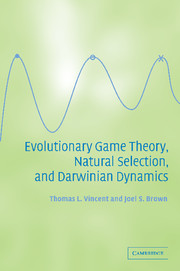Book contents
- Frontmatter
- Contents
- List of figures
- Preface
- 1 Understanding natural selection
- 2 Underlying mathematics and philosophy
- 3 The Darwinian game
- 4 G-functions for the Darwinian game
- 5 Darwinian dynamics
- 6 Evolutionarily stable strategies
- 7 The ESS maximum principle
- 8 Speciation and extinction
- 9 Matrix games
- 10 Evolutionary ecology
- 11 Managing evolving systems
- References
- Index
7 - The ESS maximum principle
Published online by Cambridge University Press: 11 August 2009
- Frontmatter
- Contents
- List of figures
- Preface
- 1 Understanding natural selection
- 2 Underlying mathematics and philosophy
- 3 The Darwinian game
- 4 G-functions for the Darwinian game
- 5 Darwinian dynamics
- 6 Evolutionarily stable strategies
- 7 The ESS maximum principle
- 8 Speciation and extinction
- 9 Matrix games
- 10 Evolutionary ecology
- 11 Managing evolving systems
- References
- Index
Summary
The definition of an ESS in Chapter 6 requires that an ESS be convergent stable and resistant to invasion by alternative strategies. The Darwinian dynamics discussed in Chapter 5 provides convergent stability. In this chapter, an ESS maximum principle is obtained that characterizes the property of resistance to invasion. We show that, when u and x* have values corresponding to an ESS, the G-function must take on a maximum with respect to the focal strategy, v, when v is set equal to one of the strategies of the ESS. Like the Nash equilibrium, an ESS is a no-regret strategy for the G-function in the sense that at an ESS no individual can gain a fitness advantage by unilaterally changing strategy. This property of the ESS, as expressed in terms of the G-function, can be used as a necessary condition for solving for candidate ESS solutions. This necessary condition is formalized in this chapter as the ESS maximum principle. This principle also describes the property of adaptation, the true sense of FF&F. An adaptation is a strategy that maximizes individual fitness as determined from the G-function given the circumstances, and these circumstances include the strategies and population sizes of others.
We use the term ESS candidate to refer to any solutions obtained using the ESS maximum principle. While an ESS candidate will be resistant to invasion, it need not satisfy the convergent stability property required by the ESS definition. Thus, convergence stability must be checked by some other method.
- Type
- Chapter
- Information
- Publisher: Cambridge University PressPrint publication year: 2005



